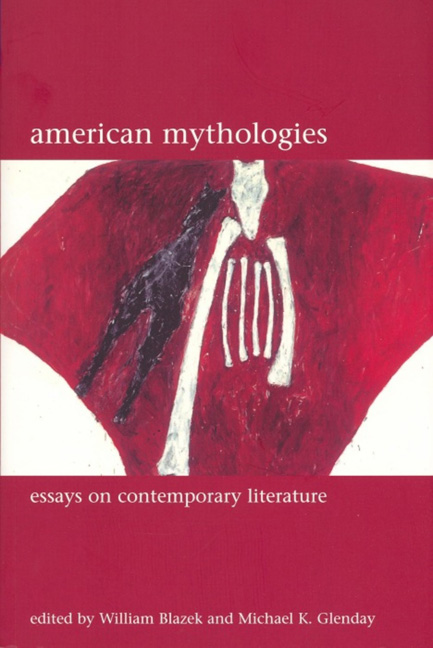Book contents
- Frontmatter
- Dedication
- Contents
- Acknowledgements
- Introduction
- 1 Indians with Voices: Revisiting Savagism and Civilization
- 2 Wild Hope: Love, Money and Mythic Identity in the Novels of Louise Erdrich
- 3 Float Like a Butterfly, Sting Like a Bee: Mythologies of Representation in Selected Writings on Boxing by Norman Mailer
- 4 The Secret Sharing: Myth and Memory in the Writing of Jayne Anne Phillips
- 5 The Individual's Ghost: Towards a New Mythology of the Postmodern
- 6 ‘Cheap, On Sale, American Dream': Contemporary Asian American Women Writers’ Responses to American Success Mythologies
- 7 ‘No Way Back Forever’: American Western Myth in Cormac McCarthy's Border Trilogy
- 8 Native American Visions of Apocalypse: Prophecy and Protest in the Fiction of Leslie Marmon Silko and Gerald Vizenor
- 9 The Brave New World of Computing in Post-war American Science Fiction
- 10 Mythologies of ‘Ecstatic immersion’: America, The Poem and the Ethics of Lyric in Jorie Graham and Lisa Jarnot
- 11 Whose Myth is it Anyway? Coyote in the Poetry of Gary Snyder and Simon J. Ortiz
- 12 Aging, Anxious and Apocalyptic: Baseball's Myths for the Millennium
- 13 Finding a Voice, Telling a Story: Constructing Communal Identity in Contemporary American Women's Writing
- Notes on Contributors
- Index
7 - ‘No Way Back Forever’: American Western Myth in Cormac McCarthy's Border Trilogy
- Frontmatter
- Dedication
- Contents
- Acknowledgements
- Introduction
- 1 Indians with Voices: Revisiting Savagism and Civilization
- 2 Wild Hope: Love, Money and Mythic Identity in the Novels of Louise Erdrich
- 3 Float Like a Butterfly, Sting Like a Bee: Mythologies of Representation in Selected Writings on Boxing by Norman Mailer
- 4 The Secret Sharing: Myth and Memory in the Writing of Jayne Anne Phillips
- 5 The Individual's Ghost: Towards a New Mythology of the Postmodern
- 6 ‘Cheap, On Sale, American Dream': Contemporary Asian American Women Writers’ Responses to American Success Mythologies
- 7 ‘No Way Back Forever’: American Western Myth in Cormac McCarthy's Border Trilogy
- 8 Native American Visions of Apocalypse: Prophecy and Protest in the Fiction of Leslie Marmon Silko and Gerald Vizenor
- 9 The Brave New World of Computing in Post-war American Science Fiction
- 10 Mythologies of ‘Ecstatic immersion’: America, The Poem and the Ethics of Lyric in Jorie Graham and Lisa Jarnot
- 11 Whose Myth is it Anyway? Coyote in the Poetry of Gary Snyder and Simon J. Ortiz
- 12 Aging, Anxious and Apocalyptic: Baseball's Myths for the Millennium
- 13 Finding a Voice, Telling a Story: Constructing Communal Identity in Contemporary American Women's Writing
- Notes on Contributors
- Index
Summary
All the Pretty Horses and The Crossing, the first two parts of Cormac McCarthy's The Border Trilogy, were published in 1992 and 1994 respectively. They transformed McCarthy from a writer praised and appreciated by a minority to a cult author read by a mass audience. All the Pretty Horses won the National Book Award for fiction and received the highest critical praise: ‘up there with Catch 22 and Rabbit at Rest; one of the great American postwar novels’. The Crossing, too, became an immediate bestseller.
The most obvious feature of these two novels is their use of the conventions of the Western, though relocated in a Mexican landscape. There is every reason to believe that it is McCarthy's reliance on this generic base that helped to stimulate the popular and critical success of the books. The Award citation for All the Pretty Horses refers to it as a novel that ‘rides on cold and exhilarating heights’ with ‘boy heroes who have the stature of true myth’. While Alan Cheuse speaks of the main protagonist, John Grady Cole, in terms of ‘one young Texan's growth of soul’, and describes ‘his education as a breaker of horses and prodigal son, as a boy turned man by means of love and tested by imprisonment and the blade’. McCarthy's representation of a ‘world of horses and guns ... cowboys and Indians ... loners and outcasts ... vaqueros and caballeros’ seems to have touched some particular chord to which its audience has strongly responded.
The Border Trilogy is not, however, the first time that McCarthy has adopted, and adapted, the Western form. Indeed, Dana Phillips judges Blood Meridian or the Evening Redness in the West (1985), which also ‘might be called a “Western”’, more ‘noteworthy’ than All the Pretty Horses.
- Type
- Chapter
- Information
- American MythologiesNew Essays on Contemporary Literature, pp. 128 - 156Publisher: Liverpool University PressPrint publication year: 2005



